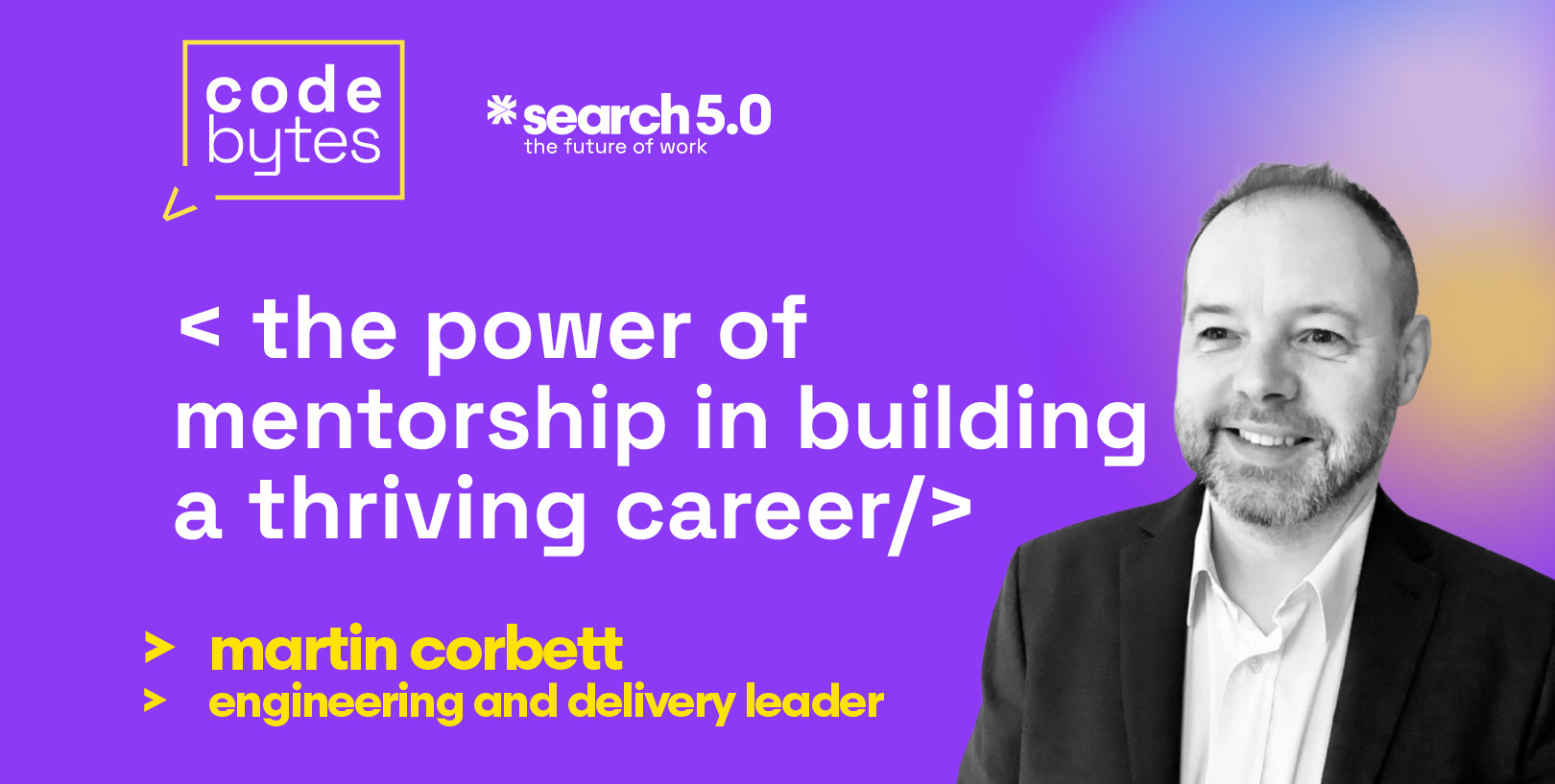
Breaking Barriers in Technology Recruitment
Technology recruitment in Northern Ireland and across the UK is evolving rapidly, with a growing demand for skilled professionals in data, AI, and cloud engineering. In a recent episode of Code Bytes, hosted by Carol Donnelly, we welcomed Katie Willoughby, Head of Data Analytics at Frontline UK, to discuss her unconventional journey into technology, leadership in data analytics, and the challenges women face in the industry. From transitioning from biosciences to data analytics to navigating the complexities of returning to work after maternity leave, Katie’s insights offer invaluable lessons for anyone seeking jobs in technology and looking to advance in their career.
Navigating Career Transitions in Technology
Initially studying maths and biology at university, she pursued a master's degree in cancer sciences, applying machine learning algorithms to identify receptors in breast cancer for precision medicine. While she had always leaned towards biosciences, Katie found herself drawn to data analytics, a field that was growing rapidly and offering exciting opportunities in problem-solving and business impact.
Her first role after university was with the Biotechnology and Biosciences Research Council, where she worked in peer review processes for bioscience grant funding. However, she soon found herself seeking a more dynamic career path. A pivotal moment in her transition occurred when UK Research and Innovation formed a central data analytics team, giving Katie her first exposure to the world of data and AI. Without fully understanding what a data analyst role entailed, she took the leap—and it paid off.
This highlights a crucial point in technology recruitment: many professionals pivot into tech careers from seemingly unrelated backgrounds. Katie’s journey proves that skills in critical thinking, problem-solving, and analytics are transferable, making jobs in technology accessible to a wide range of candidates.
From Public Sector to Private Sector: Understanding Contract Roles in Technology
After gaining experience in data analytics, Katie moved to Belfast, taking a role as a research and statistical analyst at Belfast Met. Her career took another turn when she entered precision medicine, working in data analytics consulting for large pharmaceutical companies. This position gave her leadership responsibilities, allowing her to gain certifications in management and leadership development while leading teams across the UK and US.
However, moving into private-sector contract roles in technology presented a new set of challenges. Unlike the structured salary bands of the public sector, Katie found salary negotiation in the private sector to be far more ambiguous. She shared how early in her career, she made the mistake of disclosing her current salary during negotiations, leading to an offer only slightly above her existing pay, despite the new role being significantly more demanding.
For professionals looking at contract roles in technology, Katie’s advice is clear: do your research, understand your market value, and never disclose your current salary. Employers should focus on paying candidates for the role they are stepping into, not basing offers on previous earnings.
The Role of Cloud Engineering and DevOps in Data Analytics
As Head of Data Analytics at Frontline UK, Katie oversees a team that supports an American home insurance company by providing insights into catastrophe modelling, fraud detection, and infrastructure and support for their tech operations. With cloud engineering and DevOps becoming increasingly vital, her team plays a critical role in ensuring that data is not only accessible but also actionable.
Katie emphasises that technology recruitment in the UK needs to focus on professionals who not only understand data but also possess strong business acumen. Too often, she has interviewed candidates who are technically proficient but struggle to articulate how their work impacts the business. For those entering the industry, the ability to tell the story behind the data is just as crucial as coding skills.
Women in Technology: Overcoming Challenges in Leadership and Software Engineering
Katie is the only female head of department at Frontline UK, a fact that highlights the ongoing gender imbalance in technology recruitment. While she has worked with supportive colleagues, she has also faced imposter syndrome and moments of self-doubt, questioning whether she was hired for her skills or simply to meet diversity quotas.
To combat these challenges, Katie became actively involved in mentoring, leadership training, and public speaking. She recognised the importance of visibility for women in tech and started attending and speaking at industry events. This not only helped her build her personal brand but also provided opportunities to advocate for more women in leadership roles within software engineering, software testing, and data analytics.
Returning to Work After Maternity Leave: Transformation and Change in the Workplace
Returning to work after maternity leave is a significant transition for many women, and Katie’s experience was no different. She spoke candidly about the mental shift from being a high-performing professional to a full-time mother overnight. While her company was supportive, she recognised that many women struggle with balancing professional ambitions and family life.
Katie continued to engage with her industry during her maternity leave, attending events and maintaining her LinkedIn presence to ensure she remained professionally relevant. She also emphasised the importance of flexible work policies and infrastructure and support in retaining talented women in tech.
Building a Strong Personal Brand in Data and AI
One of the most insightful takeaways from Katie’s journey is the power of personal branding in data and AI. She highlighted how attending events, networking, and posting on LinkedIn helped her secure speaking engagements and career opportunities. This is a valuable lesson for professionals in technology recruitment: visibility matters.
She encourages aspiring technologists to say yes to opportunities, even if they feel unqualified. Many of her biggest career advancements came from taking risks, speaking on panels, and advocating for herself.
The Future of Technology Recruitment in the UK
With technology recruitment in the UK evolving rapidly, professionals must be adaptable, willing to reskill, and continuously learn. Katie’s journey from biosciences to data analytics demonstrates that career changes are possible at any stage. Her advice to job seekers is to embrace change, develop both technical and professional skills, and remain open to unexpected career paths.
The conversation between Carol Donnelly and Katie Willoughby on Code Bytes was an inspiring look at the realities of working in tech, overcoming challenges, and driving change. Whether you’re seeking jobs in technology, transitioning into a new role, or looking to advance in cloud engineering and DevOps, Katie’s insights offer practical guidance on navigating the tech industry.
This episode of Code Bytes resonates deeply with Search 5.0’s mission as a technology recruitment company. As specialists in technology recruitment in the UK and Northern Ireland, Search 5.0 understands the importance of hiring the right talent across data and AI, software engineering, cloud engineering and DevOps, infrastructure and support, and product management—all key themes discussed in the episode.
Katie’s career journey highlights the dynamic nature of jobs in technology, illustrating how transferable skills and adaptability are crucial for success in this sector. Her transition from biosciences to data analytics is a testament to how professionals can enter the tech industry from unconventional backgrounds—a principle that aligns with Search 5.0’s approach to identifying talent beyond traditional career pathways. This reflects a growing trend in technology recruitment where problem-solving abilities, critical thinking, and business impact matter just as much as technical proficiency.
Another significant theme in the episode is the importance of diversity and inclusion in technology recruitment. Katie discusses her experience as the only female head of department at her company in the UK and the challenges women face in leadership roles in software engineering, software testing, and data analytics. At Search 5.0, we actively advocate for a more inclusive hiring process, ensuring that companies recognise and address the gender imbalance in tech. By supporting candidates from diverse backgrounds and promoting inclusive hiring practices, we help businesses attract top talent that drives innovation.
The episode also sheds light on the evolving demands of technology recruitment, particularly in sectors such as cloud engineering and DevOps, transformation and change, and infrastructure and support. As organisations increasingly rely on data-driven decision-making, the need for professionals who can translate complex data into actionable insights has never been greater. Search 5.0 plays a pivotal role in matching top-tier talent with forward-thinking companies that require specialists in these high-demand areas.
Ultimately, this discussion on Code Bytes reinforces Search 5.0’s mission to identify, attract, and place the best talent in technology recruitment. Whether companies are looking for permanent hires or contract roles in technology, the insights shared in this episode underscore the importance of adaptability, business impact, and strategic hiring in shaping the future of tech talent.




